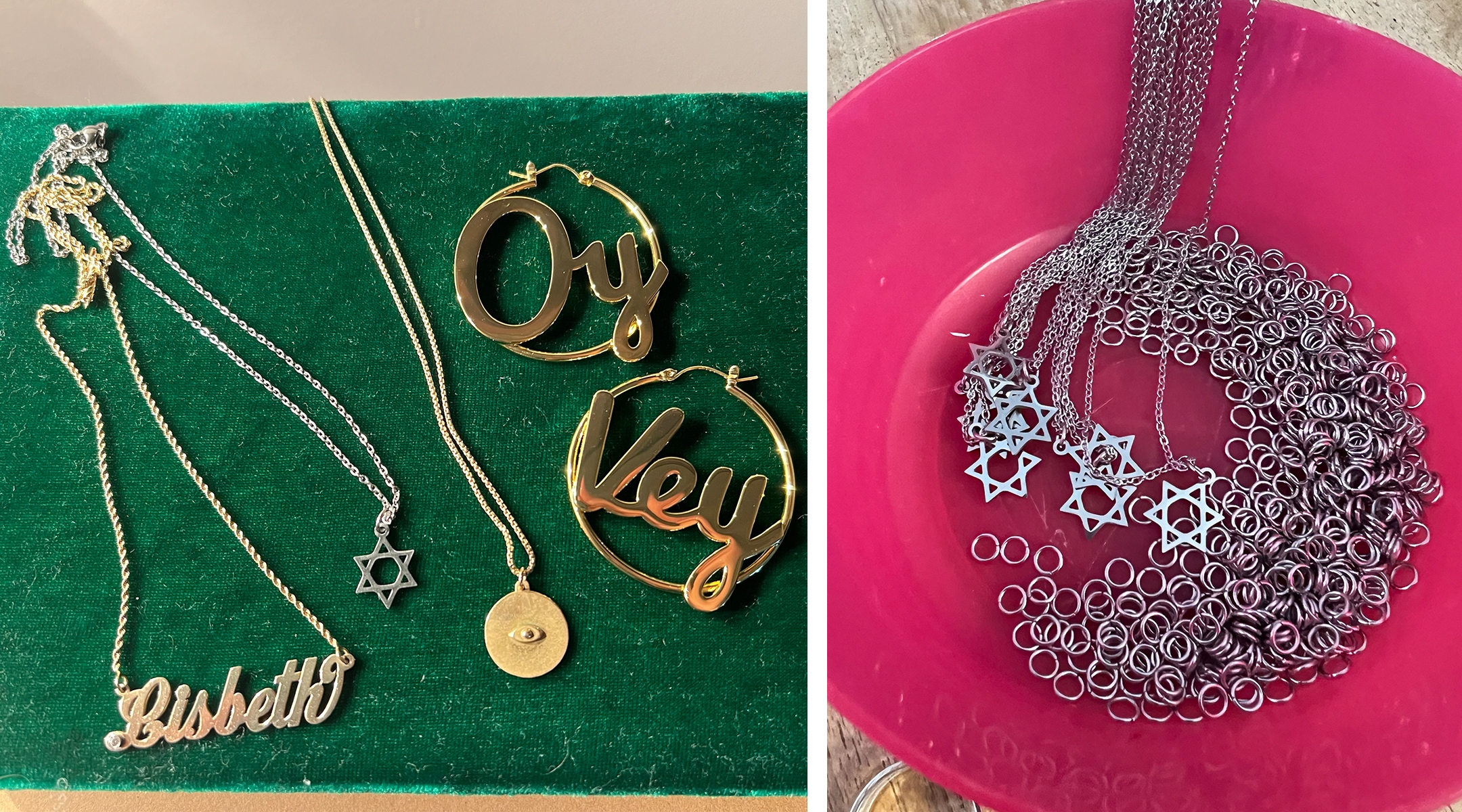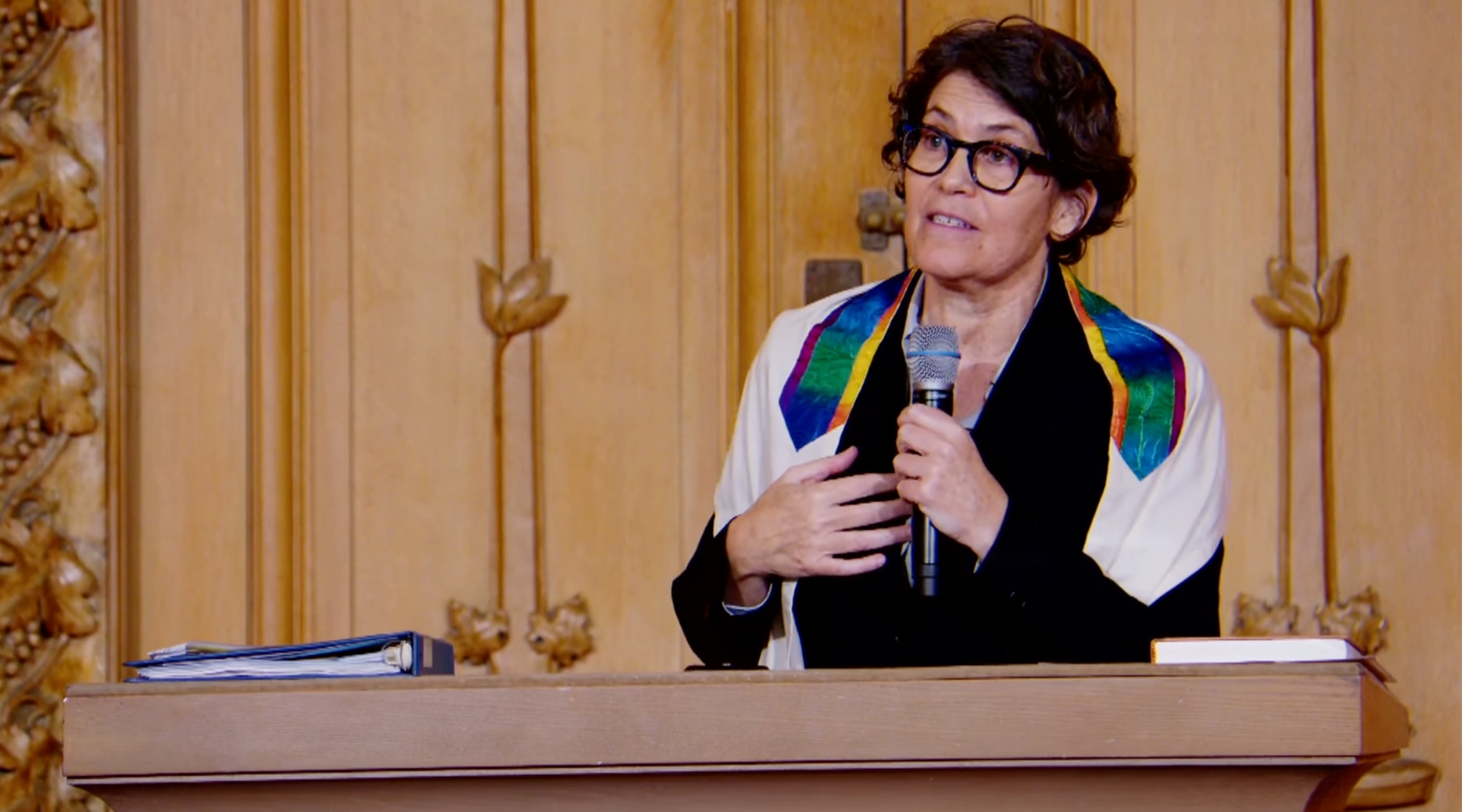All rabbis want congregants to leave High Holiday services with a lasting message, an intangible artifact of their sermons. This year, Rachel Timoner, the senior rabbi of Brooklyn’s Congregation Beth Elohim, sent them home with a physical relic as well.
“I have a present for you — it’s a necklace with a Jewish star,” Timoner announced at the tail end of her 28-minute sermon on the first day of Rosh Hashanah, to the 1,300 people packed into CBE’s Park Slope sanctuary.
It took a few moments for the congregants to realize that the rabbi was not speaking metaphorically — at each aisle seat was a paper bag filled with sachets, each containing a stainless-steel Star of David necklace, sourced by Brooklyn jeweler and CBE congregant Loren Celedonia.
The gift, which called to mind Oprah Winfrey’s habit of telling her TV audience to look under their chairs for lavish surprises, capped a sermon that addressed the war in the Middle East, escalating concerns about antisemitism, and what it feels like to be a Jew in an uncertain moment. She said the necklaces reflected both a need for “Jewish visibility” and her belief that people of all backgrounds and ideologies have equal claim to Jewish identity.
“Maybe you’ll want to put it on today and see how it feels,” Timoner said. “Maybe you’ll want to put it somewhere meaningful in your home and save it for another day. It’s a way of saying to the world. Why yes, I am Jewish. This is what a Jew looks like. This is what a Jew stands for. This is how a Jew behaves.”
Delight and laughter rang through the sanctuary as people opened the bags and clasped the necklaces around their necks.
“I was really happy to get this necklace and to add it to my stack,” said Lisbeth Kaiser, a children’s book author and CBE member. Kaiser said that since Hamas’ Oct. 7, 2023, attack on Israel, she has started wearing Judaica again — her grandfather’s Star of David necklaces, jewelry from her bat mitzvah, and various pieces she’s collected over the years.
Kaiser said she’s added the necklace gifted by CBE to her daily stack of necklaces, which includes an evil eye and a butterfly, the latter of which is a symbol of her “coming out” as a proud Jew this year.
“We are hearing other people’s narratives about us as Jews and this is a chance to say who we are,” Kaiser said. “I have been wearing my Star of David more since Rosh Hashanah, knowing that it’s not just any star but one that my whole community has. I think it’s so important that we got the blessing to wear this star by Rabbi Timoner exactly as we are. It’s an emblem of our humanity.”
In a world transformed by the Oct. 7 attacks and the subsequent war between Israel and its neighbors, wearable Jewish symbols like kippahs and Star of David jewelry have taken on new significance. Amid rising antisemitism, some Jews have newly embraced wearing Judaica as a way to demonstrate their Jewish pride. At the same time, however, many Jews have expressed fear over wearing such outward displays of their religion — a June survey by the American Jewish Committee found that since Oct. 7, 42% of American Jews have felt unsafe wearing Jewish symbols in public.
Journalist and poet Jo-Ann Mort, a 30-year member of CBE, passed on the necklace at her seat to a family member because she already had her own, newly. “I bought a Jewish star that I wear everyday that fits my personality and I had never done that in my life,” she said. “I felt it was very important after Oct. 7.”
With the giveaway, the clergy at Congregation Beth Elohim hoped to equip their congregants to make a similar move. CBE had ordered 1,000 necklace at $1 a pop — an impressive quantity, but not enough for each person at services that day. Perhaps because of the Oct. 7 effect, the pews were “fuller than ever before,” the congregation wrote in a message to congregants.
Due to popular demand, Beth Elohim has reupped the order — and then some. “If you would like a necklace and didn’t receive one, we are ordering 2,000 more and will update you when they’re available to pick up,” said the email that went out to the synagogue’s list. “We’ll be making them available to both members and non-members of CBE.”

Left: A sample of CBE member Lisbeth Kaiser’s Judaica jewelry collection, including the Star of David necklace that she received on Rosh Hashanah. (Courtesy). Right: Local jeweler Loren Celedonia, a CBE member, spent five days assembling the necklace ahead of the giveaway. (Courtesy)
In an interview, Timoner said she’d love to give a Star of David necklace to anyone who wants one.
“People found it to be really rousing and bolstering — they felt supported, encouraged, less alone, and had a belongingness to our people,” she said. “I was just reminding them of their Jewish pride.”
Timoner explained how, leading up to the High Holy Days, she and the congregation’s clergy team were brainstorming about how best to support their members as the anniversary of Hamas’ Oct. 7 attacks approached. She added that many of her congregants had expressed tumultuous and mixed emotions this past year as the war between Israel and Hamas grew deadlier, from isolation to fear to shame.
“I already knew I wanted to speak about the ways we have been demoralized and in pain this year, and to encourage people to come back to all the ways they are proud to be Jewish,” Timoner said. “Someone on the team thought: ‘What if it was possible to give everybody a Jewish star necklace?”
It was an order that local jeweler Celedonia was thrilled to receive. “I’ve been a jeweler for 25 years and was happy to make this happen for Rabbi Timoner,” she said.
Due to the extra-large, last-minute request, Celedonia, a fine jeweler, was not able to fabricate the Star of David necklaces fully herself. (Celedonia doesn’t currently sell Star of David jewelry, though she made a necklace with the symbol for her daughter.) But through her contacts, she was able to quickly source a Star of David pendant, jump rings to fasten the pendant to the chain, and the chain itself. Celedonia said she fastened about 200 jump rings a day to the pendants to fashion the necklaces; the project took her five days to put together.
She was in the main sanctuary when Timoner made the announcement. “I was sitting next to my father and he was so proud,” Celedonia said, adding that later in the day, she felt moved by “all the Jewish stars twinkling along the water” when the congregation gathered for a tashlich service at Prospect Park.
“Just when it seems risky or shameful to be visibly Jewish, this is when your people need you most,” Timoner said in her sermon. “We need each other, precisely because it is so difficult to be a Jew right now. We need Jewish visibility. We need to see Jews like us wearing Jewish stars on the subway and at the PTA meeting and at the pride parade and at the office and at the block party. … We are Jews who will not hide, who will not be silent, who will not allow others to speak for us.”
The New York Jewish Week brings you the stories behind the headlines, keeping you connected to Jewish life in New York. Help sustain the reporting you trust by donating today.





